Rita Hayworth and Shawshank Redemption is a realist novella by Stephen King. It was first published in 1982 by Viking Press in his collection Different Seasons. It was later included in the 2009 collection Stephen King Goes to the Movies. The plot follows former bank vice president Andy Dufresne, who is wrongly convicted of murdering his wife and her lover and ends up in Shawshank State Penitentiary, where corruption and violence are rampant.
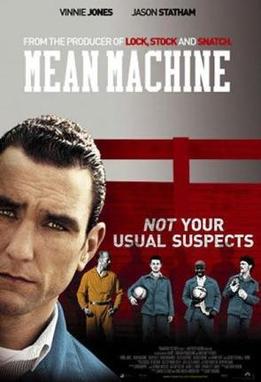
Mean Machine is a 2001 British sports comedy film directed by Barry Skolnick and starring former footballer Vinnie Jones. The film is an adaptation of the 1974 American film The Longest Yard, featuring association football rather than American football.
The women in prison film is a subgenre of exploitation film that began in the early 20th century and continues to the present day.

My Six Convicts is a 1952 American film noir crime drama directed by Hugo Fregonese. The screenplay was adapted by Michael Blankfort from the autobiographical book My Six Convicts: A Psychologist's Three Years in Fort Leavenworth, written by Donald Powell Wilson.

Brute Force is a 1947 American crime film noir directed by Jules Dassin, from a screenplay by Richard Brooks with cinematography by William H. Daniels. It stars Burt Lancaster, Hume Cronyn, Charles Bickford and Yvonne De Carlo.
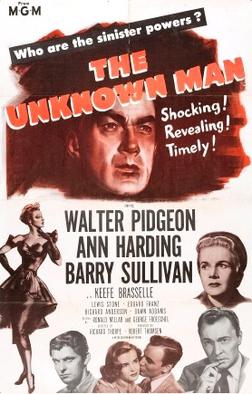
The Unknown Man is a 1951 American courtroom drama film directed by Richard Thorpe and starring Walter Pidgeon, Ann Harding and Barry Sullivan.

Fourteen Days in May is a documentary film directed by Paul Hamann and originally shown on television by the British Broadcasting Corporation (BBC) in 1987. The programme recounts the final days before the execution of Edward Earl Johnson, an American prisoner convicted of rape and murder and imprisoned in the Mississippi State Penitentiary. Johnson protested his innocence and claimed that his confession had been made under duress. He was executed in Mississippi's gas chamber on 20 May 1987.
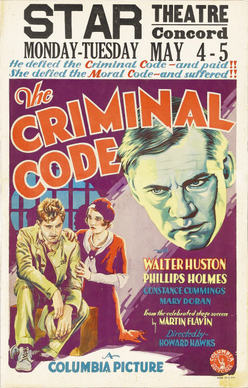
The Criminal Code is a 1930 American pre-Code romantic crime drama film directed by Howard Hawks and starring Walter Huston and Phillips Holmes. The screenplay, based on a 1929 play of the same name by Martin Flavin, was written by Fred Niblo Jr. and Seton I. Miller, who were nominated for Best Adaptation at the 4th Academy Awards but the award went to Howard Estabrook for Cimarron.

Castle on the Hudson is a 1940 American prison film directed by Anatole Litvak and starring John Garfield, Ann Sheridan and Pat O'Brien. The film was based on the book Twenty Thousand Years in Sing Sing, written by Lewis E. Lawes, on whom the warden in the film was based. Castle on the Hudson is a remake of the 1932 Spencer Tracy prison film 20,000 Years in Sing Sing, also based on Lawes's book.
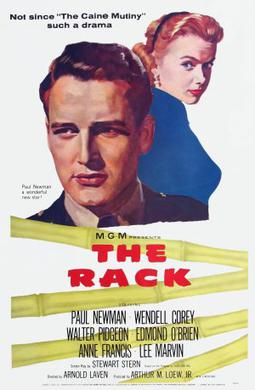
The Rack is a 1956 American war drama film, based on a television play written by Rod Serling. It was directed by Arnold Laven and stars Paul Newman, Wendell Corey, Anne Francis, Lee Marvin and Walter Pidgeon.
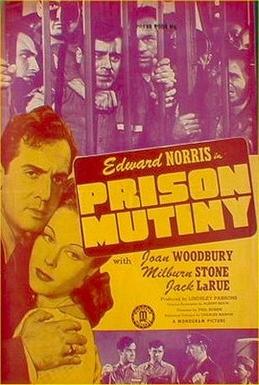
You Can't Beat the Law is a 1943 American drama film directed by Phil Rosen; also known as Prison Mutiny.

The Big Shot (1942) is an American film noir crime drama film starring Humphrey Bogart as a crime boss and Irene Manning as the woman he falls in love with. Having finally reached stardom with such projects as The Maltese Falcon (1941), this would be the last film in which former supporting player Bogart would portray a gangster for Warner Bros..

Women's Prison is a 1955 American film noir crime film directed by Lewis Seiler and starring Ida Lupino, Jan Sterling, Cleo Moore, Audrey Totter, Phyllis Thaxter and Howard Duff.
The Muppets Go Hollywood is a one-hour television special that promoted The Muppet Movie, the first theatrical film in The Muppets franchise. It first aired May 16, 1979 on CBS, six weeks before the American release of The Muppet Movie.

Penitentiary is a 1938 American crime film directed by John Brahm starring Walter Connolly, John Howard, Jean Parker and Robert Barrat. It was the second Columbia Pictures film adaptation of the 1929 stage play The Criminal Code by Martin Flavin, after Howard Hawk's The Criminal Code (1930) and followed by Henry Levin's Convicted (1950).
Charles A. Farquhar State Cattle Ranch was an Alabama Department of Corrections state prison for men, located south of the town of Greensboro in unincorporated Hale County, Alabama.

Smashing the Rackets is a 1938 American drama film directed by Lew Landers, written by Lionel Houser, and starring Chester Morris, Frances Mercer, Rita Johnson, Bruce Cabot and Edward Pawley. It was released on August 19, 1938, by RKO Pictures.

Experiment Alcatraz is a 1950 American crime film directed by Edward L. Cahn and written by Orville H. Hampton. The film stars John Howard, Joan Dixon, Walter Kingsford and Robert Shayne. The film was released on November 21, 1950, by RKO Pictures.
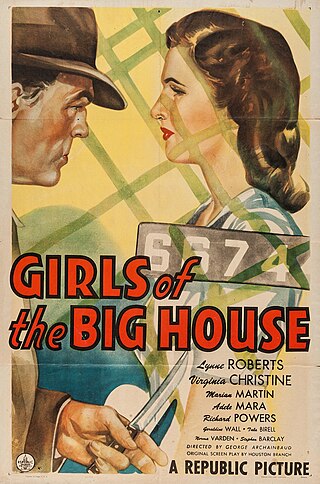
Girls of the Big House is a 1945 American drama film directed by George Archainbaud and starring Lynne Roberts, Virginia Christine and Marion Martin.

Within These Walls is a 1945 American drama film directed by H. Bruce Humberstone and written by Eugene Ling and Coles Trapnell. The film stars Thomas Mitchell, Mary Anderson, Edward Ryan, Mark Stevens, B.S. Pully and Roy Roberts. The film was released on July 13, 1945, by 20th Century Fox.















